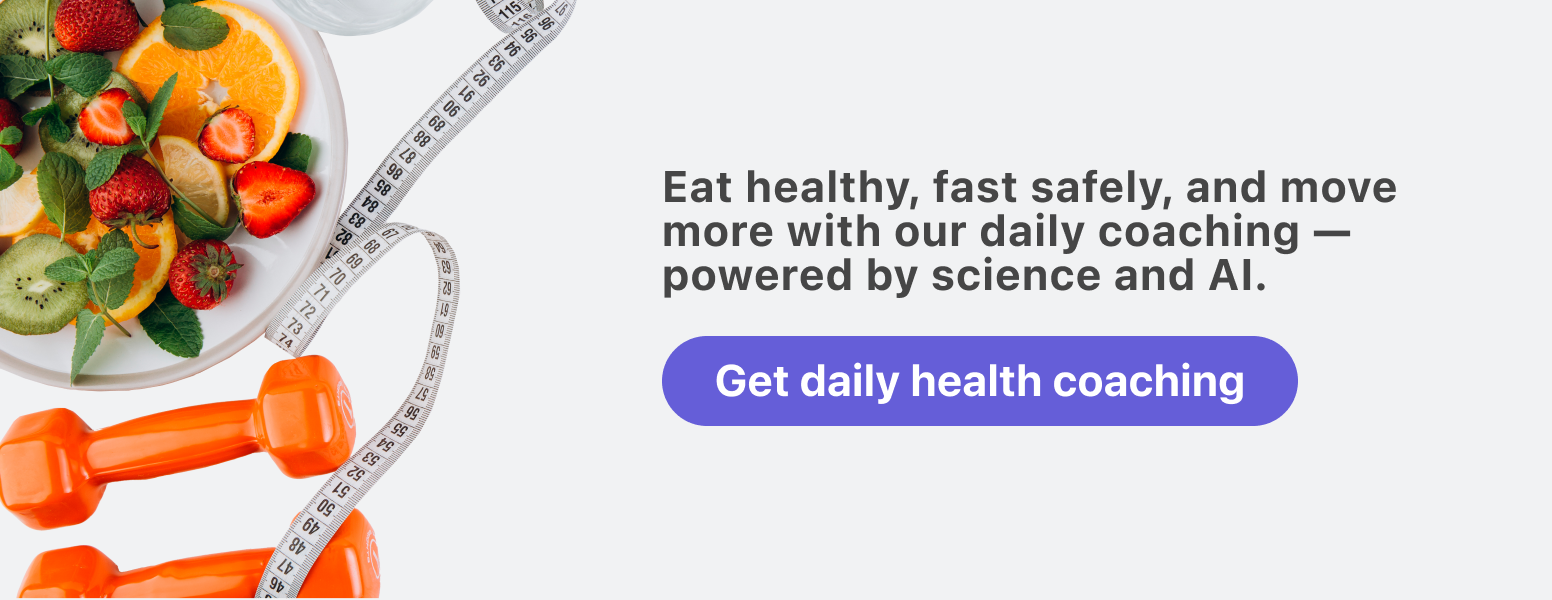Is coffee bad for you? Health benefits and risks of coffee

Love your morning brew? Well, you’re in good company.
Imagine waking up without that delightful cup of coffee — it’s practically a crime against comfort, right? Whether you’re hugging a mug while scrolling through the headlines or hustling to your favorite café for an on-the-go caffeine fix, coffee is like a trusted friend.

Guess what? This beloved brew isn’t just a source of warm fuzzies; it’s also surprisingly packed with perks!
But you might have wondered whether your coffee habit is healthy. Fear not, because science has been hard at work dissecting those coffee beans, and it turns out that your daily coffee fix might actually be doing you more good than harm.
Let’s spill the beans on coffee – the good kind of spill, of course.
(BTW, love your coffee but want to sip smartly? Take Simple’s personalized quiz, and we’ll help ensure that your beloved brew complements your fasting and wellness goals. Never miss a beat (or a sip)!)

Is coffee nutritious?
Black coffee isn’t exactly a superfood, but it’s not a nutritional villain either. An eight-ounce serving packs a mere one calorie with pretty much zero fat, carbs, or protein. The caffeine in black coffee may also help lower appetite while stimulating movement in the digestive tract.
That makes black coffee ideal for a fasting-friendly drink.
(Pro tip: some say a tiny pinch of salt in black coffee can diminish bitterness without adding calories.)
Coffee beans themselves may also contain antioxidants, compounds that help combat some of the unwanted byproducts of cellular metabolism that contribute to many chronic diseases and aging.[1–6]
What happens if you add stuff?
Many people do enjoy a little extra in their coffee. During your eating window, feel free to enjoy milk, cream, non-dairy milk, or sweeteners. Just be aware that these add calories.
For instance:
- Mixing four ounces of coffee with four ounces of 2% milk = 55 calories.
- That plus 2 teaspoons of sugar = 90 calories.
So, if you’re doubling or tripling these doses throughout the day, those calories can gang up on you.
And, of course, if you’re drinking bulletproof coffee — coffee with butter and/or oil blended into it — those calories can add up too. 1 tablespoon of butter or oil has 120 calories, so a few tablespoons can have as many calories as a meal.
What about those coffee shop concoctions that could double as dessert? While they’re a decadent treat, they can sometimes pack more punch than you bargained for. Those creamy, syrupy, extra-large cups might make your taste buds dance, but your calorie count might be doing the cha-cha, too! Some can be as high as several hundred calories.
And if you’re worried about keeping track of those daily coffee sips (especially with a little milk here or sweetener there), why not give the Simple app a try? The hydration tracker and food journal will help you stay on track. Head on over to the Simple quiz to get started today!
What are the health benefits of coffee?

We used to think coffee was “bad for you.” Now we know that it may have many health benefits — depending on the person.
People vary genetically in their response to coffee and caffeine, which explains why scientific studies on coffee often have mixed results.[7,8]
For instance, people who are genetically “slow metabolizers” of caffeine don’t process or excrete caffeine as well as those who are genetically “fast metabolizers.” This means that caffeine hangs around longer and may cause problems like insomnia.
However, in general, coffee has been studied for health benefits like:
- Reducing heart disease risk: In some people, moderate coffee intake seems to lower heart disease risk through several mechanisms, such as by potentially lowering inflammation.[6,9,10]
- Lowering cataract risk: Many eye diseases like cataracts occur with the oxidative stress and inflammation of aging. Some research suggests that coffee may help lower the risk via its antioxidant properties.[2] However, we need more research to validate this.
- Supporting DNA repair: Having healthy DNA means your cells are functioning correctly, and you have a lower risk of cancer. Drinking coffee seems to produce an adaptive cellular response that involves producing more enzymes involved in cell defense and repair.[11] One study showed that coffee might protect your DNA from breakage.[12] Again, we aren’t completely sure of the link, and this is still an area of ongoing research.
- Lowering type 2 diabetes risk: One review of about 50,000 coffee drinkers found that each cup of coffee a person drank per day lowered their average risk of type 2 diabetes by about 6%, up to a limit of 6 cups.[11] But again, we need more research to confirm this link.
- Decreasing inflammation: Coffee seems to have anti-inflammatory effects due to its polyphenol content, which may help explain why it seems to decrease the risk of many health problems with an inflammatory component, such as heart disease.[6]
- Contributing to a healthy gut microbiome: Coffee seems to influence the gut microbiome (aka friendly bacteria, viruses, and fungi in our gastrointestinal tract) for the better, such as potentially increasing microbial diversity.[13] But you know the drill … we need more research to form a link between the two. [14,15,16]
What are the health risks of coffee?
Again, like the health benefits, health risks can vary from person to person.
Caffeine intake
Caffeinated coffee works its magic on alertness and focus by blocking adenosine receptors in the brain.[17] Adenosine is a protein that builds up while we’re awake — once it gets high enough, it tells our brain it’s time to sleep. By blocking adenosine, caffeine can help our brains temporarily ignore this fatigue-producing buildup.
For most people, having a bit of caffeine, especially in the morning, is fine.
However, for people who are sensitive to caffeine, plus people with health conditions such as high blood pressure and arrhythmias, it may be wise for them to keep their caffeine intake low — no more than 2 cups of coffee (200 mg of caffeine) per day at most.[18,19,20]
Caffeine and cardiovascular disease: While moderate coffee drinking seems to be heart-friendly, drinking a lot of coffee does seem to increase the risk of heart and cardiovascular diseases.[21,22]
Caffeine and pregnancy: During pregnancy, emerging evidence suggests that moms who consume more caffeine have a higher risk of delivering infants with low birth weights.[23,24,25] Consult with your healthcare provider before making any lifestyle changes, though.
Caffeine may interfere with sleep.[26] On average, it takes about 6–8 hours for half the caffeine to clear from your body, but in some sensitive, slow-metabolizing people, it may take 12 hours or more. So, skip the coffee after noon for better sleep.
Caffeine may interfere with some medications. If you’re starting a new medication or wondering if your coffee habits inhibit your current medications, talk with your doctor.
Other issues:[27] Some folks might find that caffeine also worsens:
- irritability, anxiety, and mood swings
- long-term energy levels (i.e., you get a “high” followed by a “crash”)
- indigestion and heartburn
- irritable bowel syndrome
- headaches
- heart palpitations
How much coffee is OK?

If you’re an adult, try not to drink more than four 8-oz. cups of regular coffee per day. Any more than four cups of coffee (or 400 mg of caffeine), and you’ll approach the danger zone of caffeine’s adverse health effects.[27,28]
However, every person responds differently to different doses. If you experience headaches, sleeplessness, irritability, increased urination, increased heart rate, or palpitations, consider decreasing the amount of coffee you’re drinking or switching to decaf. And, of course, talk to your healthcare provider if these symptoms persist.
What about decaffeinated coffee?
Decaffeinated coffee is regular coffee that’s processed to have a significantly lower caffeine level. The process of decaffeination doesn’t typically impact the nutritional content or antioxidant properties of the coffee to a significant degree.
Multiple studies show that decaf coffee has the same health benefits as regular coffee.[29]
Coffee contains caffeine, which can be habit-forming — especially if you rely on caffeine to keep you alert during times of fatigue. (In other words, if you regularly don’t get enough sleep.) While coffee addiction is not as concerning as other addictions, some people may experience withdrawal symptoms like headaches and irritability if they abruptly cut down on caffeine.[30]

- Yashin A, Yashin Y, Wang JY, Nemzer B. Antioxidant and antiradical activity of coffee. Antioxidants (Basel). 2013 Oct 15;2(4):230–45.
- Ruiss M, Findl O, Kronschläger M. The human lens: An antioxidant-dependent tissue revealed by the role of caffeine. Ageing Res Rev. 2022 Aug;79:101664.
- Nigra AD, Teodoro AJ, Gil GA. A decade of research on coffee as an anticarcinogenic beverage. Oxid Med Cell Longev. 2021 Sep 15;2021:4420479.
- Tajik N, Tajik M, Mack I, Enck P. The potential effects of chlorogenic acid, the main phenolic components in coffee, on health: A comprehensive review of the literature. Eur J Nutr. 2017 Oct;56(7):2215–44.
- Román GC, Jackson RE, Gadhia R, Román AN, Reis J. Mediterranean diet: The role of long-chain ω-3 fatty acids in fish; polyphenols in fruits, vegetables, cereals, coffee, tea, cacao and wine; probiotics and vitamins in prevention of stroke, age-related cognitive decline, and Alzheimer disease. Rev Neurol . 2019 Dec;175(10):724–41.
- Poole R, Kennedy OJ, Roderick P, Fallowfield JA, Hayes PC, Parkes J. Coffee consumption and health: Umbrella review of meta-analyses of multiple health outcomes. BMJ. 2017 Nov 22;359:j5024.
- Tennent R, Ali A, Wham C, Rutherfurd-Markwick K. Narrative review: Impact of genetic variability of CYP1A2, ADORA2A, and AHR on caffeine consumption and response. Journal of Caffeine and Adenosine Research. 2020 Dec 1;10(4):125–34.
- Nehlig A. Interindividual differences in caffeine metabolism and factors driving caffeine consumption. Pharmacol Rev. 2018 Apr;70(2):384–411.
- Surma S, Sahebkar A, Banach M. Coffee or tea: Anti-inflammatory properties in the context of atherosclerotic cardiovascular disease prevention. Pharmacol Res. 2023 Jan;187:106596.
- Nieber K. The impact of coffee on health. Planta Med. 2017 Nov;83(16):1256–63.
- Kolb H, Martin S, Kempf K. Coffee and lower risk of type 2 diabetes: Arguments for a causal relationship. Nutrients. 2021 Mar 31;13(4).
- Pahlke G, Attakpah E, Aichinger G, Ahlberg K, Hochkogler CM, Schweiger K, et al. Dark coffee consumption protects human blood cells from spontaneous DNA damage. J Funct Foods. 2019 Apr 1;55:285–95.
- González S, Salazar N, Ruiz-Saavedra S, Gómez-Martín M, de Los Reyes-Gavilán CG, Gueimonde M. Long-term coffee consumption is associated with fecal microbial composition in humans. Nutrients. 2020 May 1;12(5).
- Farag MA, von Bergen M, Saleh BM, Homsi MN, Abd El-Al MS. How do green and black coffee brews and bioactive interaction with gut microbiome affect its health outcomes? Mining evidence from mechanistic studies, metagenomics and clinical trials. Trends Food Sci Technol. 2021 Dec 1;118:920–37.
- Dai A, Hoffman K, Xu AA, Gurwara S, White DL, Kanwal F, et al. The association between caffeine intake and the colonic mucosa-associated gut microbiota in humans: A preliminary investigation. Nutrients. 2023 Apr 3;15(7).
- Nehlig A. Effects of coffee on the gastro-intestinal tract: A narrative review and literature update. Nutrients. 2022 Jan 17;14(2).
- Reichert CF, Deboer T, Landolt HP. Adenosine, caffeine, and sleep-wake regulation: State of the science and perspectives. J Sleep Res. 2022 Aug;31(4):e13597.
- De Giuseppe R, Di Napoli I, Granata F, Mottolese A, Cena H. Caffeine and blood pressure: A critical review perspective. Nutr Res Rev. 2019 Dec;32(2):169–75.
- Higdon JV, Frei B. Coffee and health: A review of recent human research. Crit Rev Food Sci Nutr. 2006;46(2):101–23.
- Office of the Commissioner. Spilling the beans: How much caffeine is too much? [Internet]. U.S. Food and Drug Administration. FDA; 2023 [cited 2023 Sep 21]. Available from: https://www.fda.gov/consumers/consumer-updates/spilling-beans-how-much-caffeine-too-much
- Zhou A, Hyppönen E. Long-term coffee consumption, caffeine metabolism genetics, and risk of cardiovascular disease: A prospective analysis of up to 347,077 individuals and 8368 cases. Am J Clin Nutr. 2019 Mar 1;109(3):509–16.
- Mendoza MF, Sulague RM, Posas-Mendoza T, Lavie CJ. Impact of coffee consumption on cardiovascular health. Ochsner J. 2023 Summer;23(2):152–8.
- James JE. Maternal caffeine consumption and pregnancy outcomes: A narrative review with implications for advice to mothers and mothers-to-be. BMJ Evid Based Med. 2021 Jun;26(3):114–5.
- Qian J, Chen Q, Ward SM, Duan E, Zhang Y. Impacts of caffeine during pregnancy. Trends Endocrinol Metab. 2020 Mar;31(3):218–27.
- Chen LW, Wu Y, Neelakantan N, Chong MFF, Pan A, van Dam RM. Maternal caffeine intake during pregnancy is associated with risk of low birth weight: A systematic review and dose-response meta-analysis. BMC Med. 2014 Sep 19;12:174.
- Gardiner C, Weakley J, Burke LM, Roach GD, Sargent C, Maniar N, et al. The effect of caffeine on subsequent sleep: A systematic review and meta-analysis. Sleep Med Rev. 2023 Jun;69:101764.
- Wierzejska R. [Caffeine–common ingredient in a diet and its influence on human health]. Rocz Panstw Zakl Hig. 2012;63(2):141–7.
- Verster JC, Koenig J. Caffeine intake and its sources: A review of national representative studies. Crit Rev Food Sci Nutr. 2018 May 24;58(8):1250–9.
- Ramli NNS, Alkhaldy AA, Mhd Jalil AM. Effects of caffeinated and decaffeinated coffee consumption on metabolic syndrome parameters: A systematic review and meta-analysis of data from randomised controlled trials. Medicina. 2021 Sep 11;57(9).
- Meredith SE, Juliano LM, Hughes JR, Griffiths RR. Caffeine use disorder: A comprehensive review and research agenda. J Caffeine Res. 2013 Sep;3(3):114–30.
